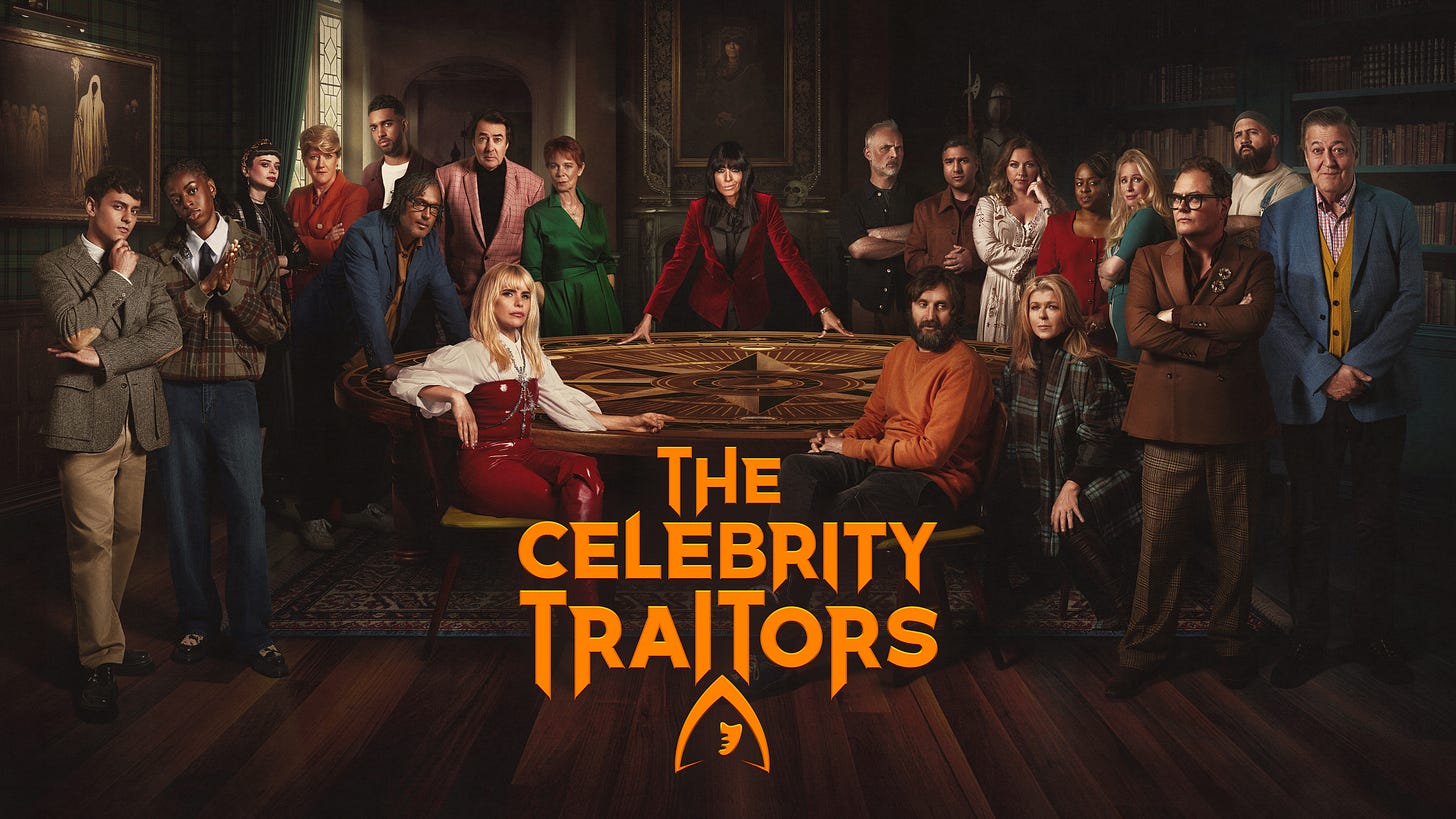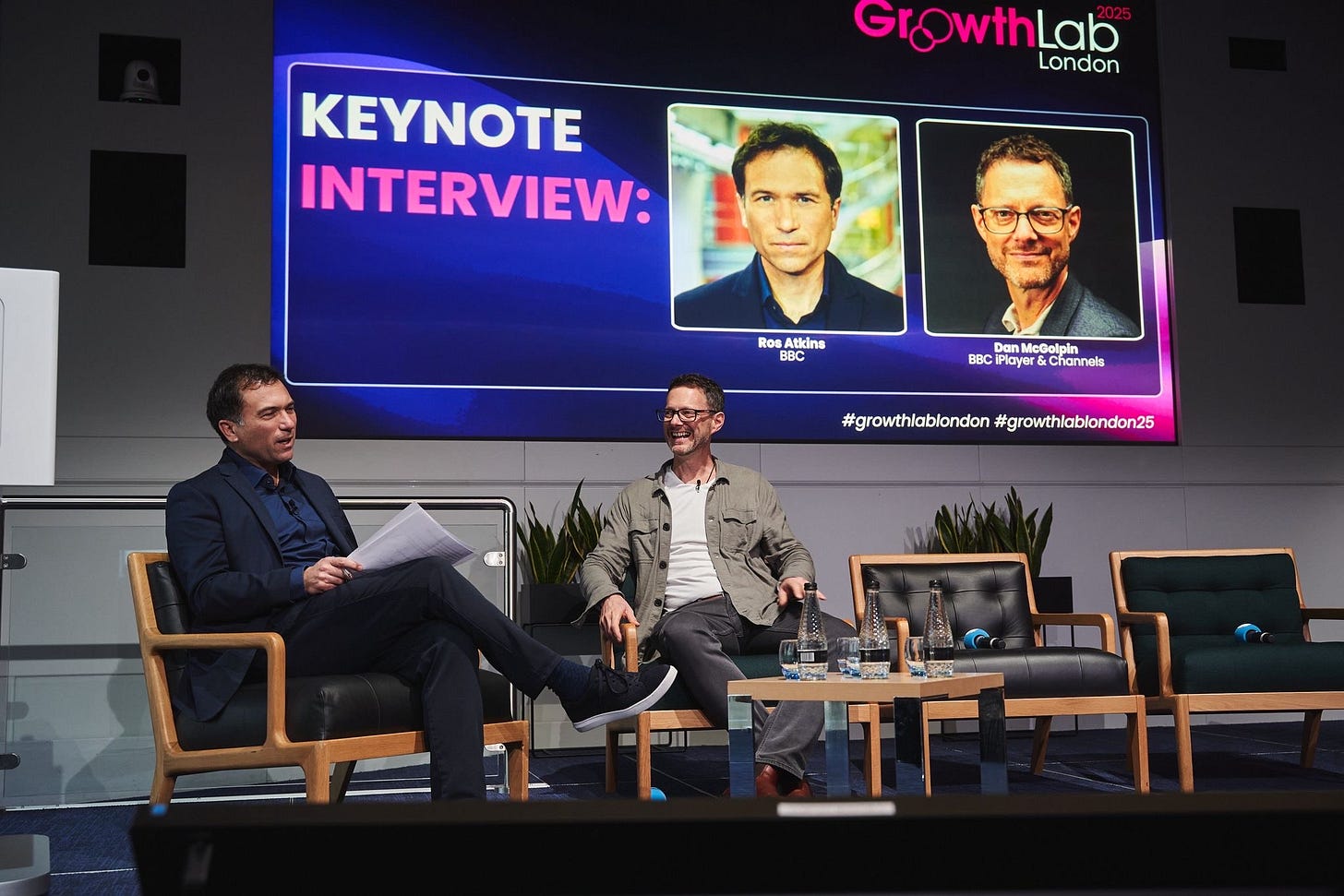BBC Director, iPlayer and Channels, Dan McGolpin: Highlights from his keynote interview at GrowthLab London
Inside the BBC’s strategy for iPlayer, live TV and the future of British content
Today we’re bringing you a special newsletter with insights from Dan McGolpin, who was quizzed forensically by BBC analysis editor Ros Atkins at GrowthLab London.
As yesterday’s newsletter detailed, despite the BBC’s current crisis, McGolpin is focused on Christmas and the future and not letting the row distract him and his team.
So read on to find how:
How different genres are performing
BBC iPlayer’s strategy
His thoughts on YouTube vs iPlayer
What shows indies can capitalise on
How habits are key
Read the full story below and subscribe for more insights and interviews from industry leaders.
New subscribers can now enjoy a one-month free trial on sign-up.
Different genres are doing different things
Chairing the keynote discussion, BBC analysis editor Ros Atkins said bearing in mind the phenomenal success of Celebrity Traitors, “do you think that people in this room and more broadly in the independent sector should be thinking differently about the type of ideas that they pitch to you and how they can be scheduled, and whether live moments could be created?”
McGolpin pointed to the huge success of the finale as evidence that mass-audience television is still alive, despite fragmentation.
He highlighted that, “the consolidated figure for episode one is up to 14.8 million” and rejected the idea that such hits were exceptions: “Actually it shows that peaks can still be peaks.”
In addition McGolpin said that, “a good idea is still a good idea”, explaining: “For all the technological change that’s going on, good content still wins out”, though “of course, TV is changing…essentially, we’re giving viewers more choice and users more choice about what they do.”
He thinks you, “have to actually analyse it, genre by genre. Different genres are doing different things.” So think about how your show might be scheduled.
For example, “there are dramas where we do tend to release them in one go. But Happy Valley, we did it weekly, because every single episode felt like a national event.”
The Night Manager will also be released weekly when it returns in January.
“With The Traitors, it’s that big…people are prepared to make an appointment with you for something of that nature,” explained McGolpin.
Though there “was some frustration Celebrity Traitors that we did make people wait…actually having a week to wait for the final plays into the sense of anticipation. We all kind of like a bit of anticipation.”
Takeaways: event TV still cuts through; anticipation can help build traction; different genres and doing different things
BBC iPlayer’s strategy
Live TV plays a major role in the focus BBC’s iPlayer.
McGolpin said though also, “it’s all about range. Some streaming services are very much concentrated only on content that has longevity and I would say also on content that’s got global appeal.
“To some degree, we can lean the opposite way. We can be utterly here from the UK, and we want to be here for every genre - including the ones that have almost no longevity at all, such as news, news and sport.”
He said audiences in sport and news on BBC “are massive” and the corporation is “leading the way when we have a football game, that’s where we can get 3 million simultaneous views…Simultaneous views on through an internet service are really hard to do.”
YouTube vs iPlayer
Atkins asked if alongside the BBC’s primary platforms of iPlayer and channels, YouTube might become a third platform for the BBC.
McGolpin responded: “I wouldn’t say quite as a third pillar in that way. Our own services are the most important. We’ve got iPlayer, BBC Sounds, we’ve got the news digital service, [the] sport digital service. We’ve got Bitesize. Not many organisations have that. When you put all of them together, I think we’ve got a real chance of being a UK-based technology service.”
He said the BBC will do more on YouTube and “the only reason I’m being slightly hesitant is because, anything’s possible, but [it] is a different platform and our primary focus is still iPlayer.”
In addition McGolpin pointed out: “From the point of view of an indie, if you want to go on YouTube, no one’s paying you to be on YouTube. YouTube aren’t doing that. Whereas, when you’re on the BBC, you get a commission. So it’s a different type of thing. “
Takeaways: BBC’s prime focus is its own services; it will do more on YouTube
Think big
When asked by Atkins if indies “need to look elsewhere” at YouTube and other platforms due to broadcasters not spending so much money in “the kind of mid-budget programmes [that] were the backbone of many independent production companies”, McGolpin acknowledged that the phrase “hollowing out the middle” has “been used a lot”.
He said he was sure many indies are “thinking about digital” but said it’s worth focusing on shows, “that someone in their bedroom can’t compete with”.
McGolpin said: “We need to be making TV that people will put their phones down for. If you can do that, you still can get big audiences that we’ve seen. So that is in good shape.
“But certain types of TV are changing,” he said such as cookery shows, “but you’ve got to think about what TV is offering, stuff that people can’t do in their bedroom.”
Takeaways: scale can offer differentiation; what shows can you make that will make people put their phone down
Changing habits
McGolpin acknowledged “the industry changing” and as advertising on traditional TV is going down, “brands are prepared to fund content.”
He said the BBC wants to help indies though its small indie funds and gave this encouragement:
“We really have to be audience focused. Ultimately technology is changing things, but it does come down to audience, and what we shouldn’t lose is habit.
“The BBC has always been great at habit, whether it’s radio, daytime, TV or indeed, news. And actually in digital it’s possible to reach your audience consistently and regularly in a way.
“This story is just about making TV slightly cheaper. It’s about really thinking about how many ways of getting to audiences can help you to build a regular habit. And that means the funding model has to change to go with that.”
Takeaways: build new habits; see what BBC indie funds might work for you






